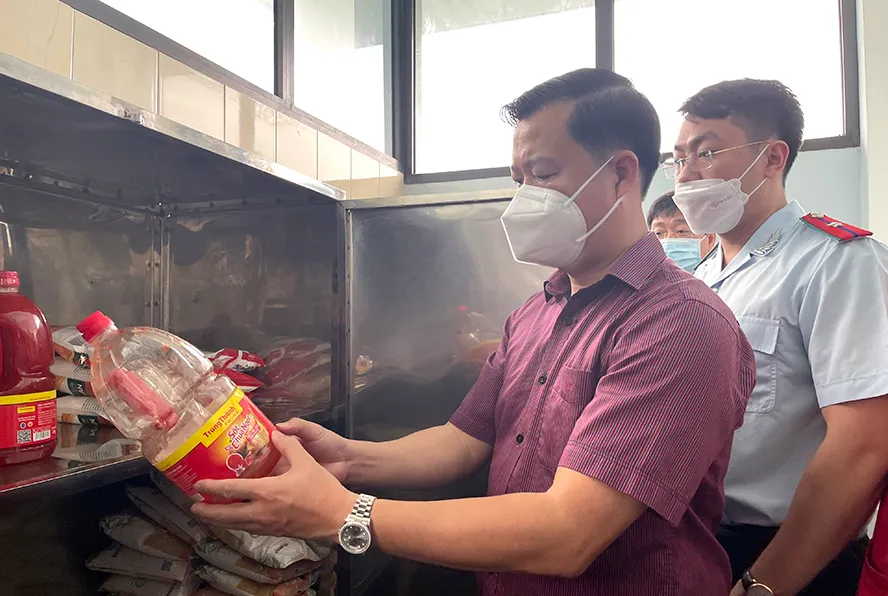Hanoi strengthens periodic and unexpected inspection in school kitchens
Schools in Hanoi are setting up food safety self-monitoring groups, assigning tasks to individual members to oversee the origin and quality of food used by school kitchens to ensure food safety and hygiene.
Hanoi authorities have strengthened inspection and supervision of the origin of food and the providers of meals to students in recent days, and will enhance periodic and unexpected inspections in school kitchens to ensure food safety and prevent foodborne diseases among children.
The move has become urgent after hundreds of students at Ischool Nha Trang International Integration School (in the southern province of Khanh Hoa) were hospitalized due to food poisoning after having lunch at the school and one student died.
The municipal government has asked all districts’ education and training divisions across the city to keep further strengthening the periodic and unexpected inspection so that they can strictly manage the origin of food at the schools.
Then, the district education and training divisions have to publicly announce qualified meal providers to students so that schools can choose those that ensure food safety in accordance with the regulations.
Checking the suppliers
According to the Hanoi Department of Health, the city currently has 4,350 school canteens. Since the beginning of 2022, the city has dispatched more than 900 inspection teams to monitor food safety, which has detected ten establishments violating food safety regulations and fined them 132 million dongs ($5,308).
An inspection team of the Hanoi Department of Agriculture and Rural Development checks food safety regulations at a school kitchen in Bac Tu Liem District. Photo: Lam Nguyen/ The Hanoi Times |
In October, when inspecting the food safety in the kitchen of the Phung Thuong Commune Primary School (Phuc Tho suburban district) and the student meal provider, the team found many shortcomings, such as the kitchen of the school has not yet guaranteed one-way food processing, and that there is no anti-insect net, among others.
Meanwhile, the Gia Thuy primary school (in the Long Bien district) always keeps a close eye on the cooking process and the traceability of food. The kitchen has complied with the regulations on hygiene and food safety such as the cooks are fully equipped with masks, gloves and hats. The school has submitted to the inspection team all legal documents proving the origin of the food.
At present, all 63 public schools in the Long Bien district have kitchens operating on the model of "Improving Self-Management Ability of Food Safety in School Canteens". Consequently, schools have created food safety self-monitoring groups, assigning tasks to each member to control the origin and quality of food used by school kitchens to ensure food safety and hygiene.
Luong Thi Minh Nguyet, Head of the Long Bien District Health Division, said that for many years when the end of the school year approaches, the People's Committee of the Long Bien District has been asking to review food suppliers and evaluate their quality and efficiency before signing the contract with them for the following year. In this way, food safety inspection and monitoring have been synchronized and effectively implemented in the district.
With a large number of school kitchens in the city, for effective management, Director of Hanoi's Deputy Director of Food Safety and Hygiene Dang Thanh Phong stressed that tracing the origin of food has helped ensure food safety in school kitchens, reduced food poisoning, and prevented foodborne diseases.
Hanoi’s inspection team of food safety and hygiene is checking the origin of food at school kitchens in the downtown district of Hai Ba Trung. Photo: Trang Thu |
“Localities should regularly inspect and monitor school kitchens. If violations or non-compliance with food safety standards are detected, suppliers may be required to stop providing food to these kitchens. School principals and administrators should keep in mind that all food brought into the school should have a clear origin, fully comply with food safety standards, and the food delivery process should have invoices, daily food delivery books, and a written agreement between the two parties,” Phong said.
"In the future, authorities will continue to focus on reviewing the process, from input materials to processing, human factors, especially the traceability of food at the place of production and supply," the deputy director added.
"The inspections show that the food safety management of the kitchens has been serious and effective," said Dang Thanh Phong.
From practical experience, Vice Chairwoman of Long Bien District People's Committee Dinh Thi Thu Huong said that to improve the effectiveness of food safety management in school kitchens, it is necessary to promote the role of inspection and supervision from authorities, schools and students' parents.
"In particular, schools have to strengthen the role of regular and irregular supervision by students' parents, controlling the origin of food ingredients from suppliers. In addition, schools have to seriously carry out food sample storage, check the origin of food ingredients, inspect food from preliminary processing to consumption, and analyze food samples in accordance with regulations," Huong said.












